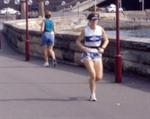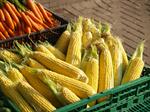Learn how nutrition relates to sporting performance

This course details some elements such as energy in the athlete's body, fluids, competition and training diets. Perfect for the amateur (or professional) sportsman, trainer, coach, or anyone wanting to better manage diet for improved or more appropriate sporting performance.
Course Content
There are nine lessons in total. At the end of each lesson there is an assignment, which you submit to your tutor for marking.
Lesson 1 Introduction to Human and Sports Nutrition.
This lesson gives the student a basic grounding in human nutrition as it relates to sport. Topics include: dietary nutrients; recommended daily intake; the balanced diet; carbohydrates (including the glycemic index), fats and proteins.
Lesson 2 Energy.
This lesson explains the concept of chemical energy and how it is produced in the human body. Topics include:
Calories and Kilojoules; energy systems and adenosine triphosphate; and aerobic vs anaerobic respiration.
Lesson 3 Energy in the athlete’s body.
This lesson examines how energy is utilised in the human body. Topics include: aerobic capacity; respiratory quotient; metabolism; stages of exercise; energy sources during exercise; and protein as an energy source.
Lesson 4 The training diet.
Looks at the principles of a training diet and how to design an effective training diet. Topics include carbohydrates; proteins and the protein needs of athletes; fats; other nutrients (such as antioxidants); and meal timing
Lesson 5 The competition diet.
In this lesson, the student will learn about the principles behind and how to design a diet for an athlete for the days leading up to, during and after a competition. Topics include carbohydrate loading and the carbohydrate needs of athletes; guidelines for pre-competition eating; eating during competition; competition, fatigue and nutrition; and competition recovery requirements.
Lesson 6 Fluids.
Explains the importance of fluids in an athlete’s diet. Topics include: the function of water in the human body; fluid needs in humans; water and solute regulation in the body; electrolytes; water and body temperature regulation; fluid intake before, during and after exercise; and intra venous fluid replacement.
Lesson 7 The athlete’s body composition.
Teaches students about the body composition of an athlete, and methods of measuring body composition. Topics include: components of the human body; body composition assessment techniques; the importance of body composition to performance; and the body mass index.
Lesson 8 Weight Management.
This lesson examines effective methods for weight reduction and body fat control where they are deemed necessary. Topics include: the mechanics of weight loss; why athletes may want to lose weight; “making weight” and “cutting up”; weight loss and physical performance; overweight people; weight change and low energy diets; tips for losing body fat; key characteristics of a safe weight reduction diet; and eating disorders.
Lesson 9 Training for Size and the use of Sports Supplements.
Examines methods of increasing muscle mass and assesses the use of sports supplements. Topics include: how to gain weight; gaining muscle mass; evaluating the use of sports supplements; types of sports supplements; and supplements and drug testing.
Aims
-
Display a basic grounding in human nutrition as it relates to sport.
-
Understand energy and how energy is produced in the body.
-
Explain how energy is utilised in the human body.
-
Understand the characteristics of, and to be able to design an effective training diet.
-
Design a diet for an athlete.
-
Understand the principles of and be able to design an athletic diet for the days leading up to, during and after a competition.
-
Explain the importance of fluids in an athletic diet.
-
Define the body composition of an athlete, and to become aware of the methods of measuring
-
Examine effective methods for weight reduction and body fat control where they are deemed necessary.
-
Examine methods of increasing muscle mass and to assess the use of sports supplements.
Scope of the Course

This course covers all of the following, with reference to nutrition in a sports context; plus more.
- What are essential nutrients?
- What is the difference between fats and oils?
- Briefly discuss the importance of carbohydrates, proteins and fats in the human diet.
- Define energy.
- Describe how ATP is converted to energy in the human body.
- What is the difference between aerobic and anaerobic respiration?
- How do actively contracting muscles get more ATP?
- What are the two main sources of ATP for muscles that are performing intense activity?
- Out of carbohydrates, fats and proteins, which substances provide the most efficient supply of energy to the human body?
- Which energy sources are used throughout the exercise session?
- Define the following terms:
- Gluconeogenesis
- RQ
- VO2 max
- TDEE
- Name three things commonly measured during fitness tests.
- Outline the primary differences between the nutritional needs of an athlete and the nutritional needs of members of the general population.
- Design a diet for an athlete.
- Why do athletes need to eat plenty of carbohydrates?
- An athlete has just finished running a half marathon (21km). What advice would you give them to help speed their recovery?
- Why do athletes need more fluid in their diet than the general population?
- What are the signs of dehydration in an athlete?
- Define the following terms:
- Electrolyte
- Body water balance
- Dehydration
- Hypohydration
- Euhydration
- Hyponatremia
- Research three common ways of determining the % of body fat present.
- Discuss the importance of body composition to sporting performance for a sport.
- What is the difference between subcutaneous and visceral fat?
- Research one of the eating disorders -
- anorexia nervosa
- bulimia nervosa
- anorexia athletica
- Why would an athlete want to lose weight?
- What are five health risks of being overweight?
- What are the possible benefits of lowered body fat in a sport.
- What is the difference between a dietary supplement and a nutritional ergogenic aid?
- Come up with three suggested meals for an athlete.
- Research the effects of one of the nutritional ergogenic aids.
In Brief - What Should Athletes Eat?
Athletes generally are well served by eating a balanced diet. It is important that athletes are aware of the principles of a healthy diet, as there is a lot of misinformation in the health and fitness industry regarding nutrition.
Beyond a healthy diet, athletes will have some extra needs during training and competition. Athletes will have different dietary needs depending on the type and intensity of their training program. What is right for an endurance runner may not be right for a body builder. Similarly, dietary needs will vary with the age and gender of the athlete. It is important to find out more about the needs of individual athletes before prescribing a program for them.
Generally, athletes need more fluid and energy in their diet than the rest of the population. Fluid is used to replace fluids lost during training, and extra energy is needed to fuel that training activity and for repair.
Extra energy can usually be obtained by increasing the amount of carbohydrates, and in particular complex carbohydrates in the diet. As energy requirements increase, athletes should aim to consume the maximum number of servings of carbohydrates whilst still meeting all their other dietary requirements. Extra carbohydrates are of particular importance to endurance athletes who need energy to be released over a long period. Endurance activities include distance running, triathlon, distance cycling, etc.
Carbohydrate loading is a technique that can help to increase the body’s stores of glycogen
Protein is an essential part of the sports training diet. It is important that athletes consume enough protein to meet their daily needs. Where carbohydrates do not provide enough energy for training, body fats and protein will be used to drive the body. Similarly, the extra tissue building and repair that takes place during training demands a certain amount of protein.
Some dietary fat is essential for the provision of essential fatty acids and fat soluble vitamins (such as vitamins E, D, and A). Fat is also an important energy source where carbohydrates cannot provide the body with enough energy for training.
A low saturated fat diet is part of a healthy eating program. Most athletes will be aiming for a fairly low saturated fat diet, especially because a western diet usually provides much more fat than is necessary. Athletes do need to make sure their fat intake isn’t excessively low.
Other nutrients such as vitamins and minerals are needed for normal body functions including energy production, haemoglobin synthesis, maintenance of bone health, immune function, repair of tissues, etc. Intense exercise can also result in increased needs for certain micronutrients.
In general, athletes will miss out on very few nutrients if they follow the guidelines for healthy eating. However, if an athlete is on a restricted energy diet, is undergoing severe weight loss, has eliminated one or more food groups from their diet, or eats carbohydrates instead of micro nutrient rich foods, they may need to take extra precautions. In most instances, a multivitamin and mineral supplement can do little harm, and may correct any deficiencies. Multivitamin/mineral supplements are generally of not needed where dietary intake and variety of foods is adequate
Improve your job and careers prospects in the field of sport, nutrition, athletics, coaching, health and fitness by understanding more about optimal nutrition.
Enrol today to find out more.
Enrolling is easy - just go to the "It's easy to enrol" box at the top of this page - this course is available to start at any time.
If you have any questions you can contact us now, by
Phone (UK) 01384 44272, (International) +44 (0) 1384 442752, or
Email us at info@acsedu.co.uk, or
Connect with our specialist tutors - use our FREE COURSE COUNSELLING SERVICE.
